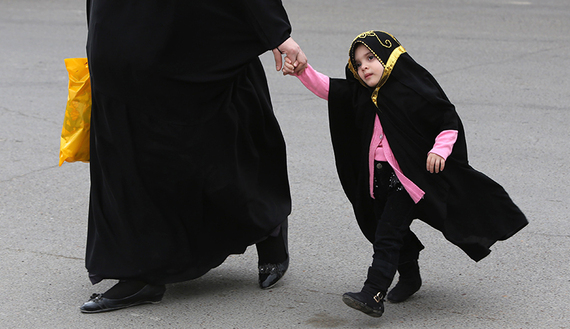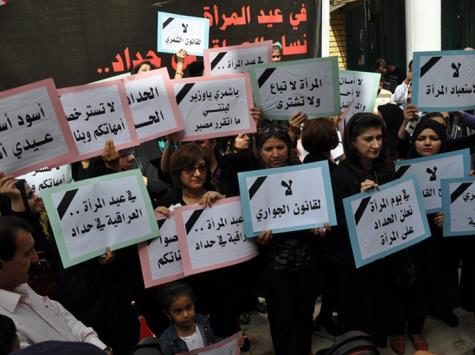Women’s Movement in Iraq Faces Setbacks!
Ali Mamouri – Al-Monitor

When well-known feminist activist Mona Eltahawy put forth her theory that women are hated and detested in the Middle East, she faced objections from both men and women in various Arab countries. Yet, when we consider the Iraqi model and watch the decline and regression in the status of women and feminist activism, we might have no choice but to accept this theory.
Iraq was a pioneer of women’s movements demanding equality between women and men in Arab countries. Very early on, Iraq saw the emergence of important figures who fought for women’s rights and to liberate them from social and religious persecution. In 1910, the famed Iraqi poet and teacher Jamil Sidky Zahawi published an article in the Egyptian journal Al-Moayedabout the need to liberate women from the shackles of backward social traditions. It was later republished in the Iraqi journal Tanweer al-Afkar. This article sparked a widespread social movement, with participants split between supporters and opponents of the idea.
In 1924, renowned Iraqi journalist Hussein al-Rahal and his colleagues founded a broad social movement for the liberation of women. The same year, the Women’s Renaissance Club was established in Baghdad. Since that time, women activists emerged calling for the liberation of women. Among the most famous of these activists is Paulina Hassoun, one of the leaders of the women’s renaissance. Hassoun launched the first Iraqi feminist journal in 1923, called Layla. Moreover, Iraq witnessed the first female minister of state in the entire Arab world, with Naziha al-Dulaimi serving as minister of municipalities from 1959-62. In 1952, Dulaimi founded the Iraqi League for the Defense of Women’s Rights (later known as the Iraqi Women’s League) and served as its first president.
Since its founding, the Iraqi women’s renaissance has been concerned with calling for a personal status law to replace the discriminatory laws that remained from the Ottoman era. After years of struggle, their efforts finally succeeded, when Iraq issued a civil personal status law in 1959. This law tried to comply with international conventions concerning women’s equality, without compromising the prevailing religious beliefs in society.
Despite the succession of dictatorships in Iraq, the secular system employed by those regimes protected the women’s movements and did not suppress them. However, when the regime of late Iraqi President Saddam Hussein launched its famous “faith campaign” in 1991, things changed completely. The political regime sought to regain legitimacy after the defeat of the Kuwait War via a union with tribal forces and fundamentalist religious groups. This resulted in a decline in social enlightenment movements, first and foremost feminist activism demanding equality for women. This activism contradicted the nature of patriarchal authority in the tribal structure and the religious beliefs of fundamentalist groups.
After 2003, the women’s current did not have the opportunity to thrive, in light of emergence of Islamic parties whose fundamentalist principles did not believe in the equality of women and men. These parties considered feminist movements a type of Masonic activity that was imported from the corrupt West. It is very clear that the beliefs of decision-makers have an obvious impact on the path of society. When the Ministry of Women’s Affairs in Iraq was taken charge of by Ibtehal Qasid al-Zaidi in 2011 — a woman with a religious background who opposed the freedom of women — and when she stated that she was against equality between men and women and believed in the necessity of the guardianship and power of men over women, then what chance did women’s rights institutes in the country have for growth and prosperity?
A number of feminist activists in Iraq have tried to conduct research and fieldwork to elevate the status of women in the country, but these attempts have ended in failure. One of the most important examples is the Iraqi Women Foundation, founded by Asmaa Jamil in 2005. This foundation submitted a number of studies and reports on various matters related to the persecution of Iraqi women, including their subjection to violence, exclusion and other forms of persecution in tribal environments or in special cases such as those of widows. The foundation also submitted legal proposals to improve the status of women in the patriarchal environment that surrounds them. However, the foundation finally closed its doors in 2011 due to a lack of finances and a complete lack of interest in its legal and social output by the concerned governmental agencies.
Furthermore, as part of an ongoing effort from 2005-11, feminist activist Nadje Sadig al-Ali tried to open feminist studies branches at Iraqi universities, as is common in international universities. But this did not attract interest or support from the concerned agencies in the Iraqi government.
After all these failures, civil activists are trying to stop draft laws that discriminate against and target women who are adopted by the religious parties in the government. The latest such incident was the passing of the Personal Status Code by the Council of Ministers, which legalized polygamy and marriage to girls as young as 9, treating the woman as a sexual commodity in society.
Finally, the civil current — which includes the feminist movement — feels very disappointed. It feels that a hundred years of struggle to advance society in women’s affairs is facing a miserable defeat, and that there has been a regression from the achievements obtained by women previously. This, in turn, emphasizes the need for concerned international institutions to support this current so that it can continue its work in spreading education, enrichng society, confronting despotic legislation and replacing the latter with civilized legal proposals.




